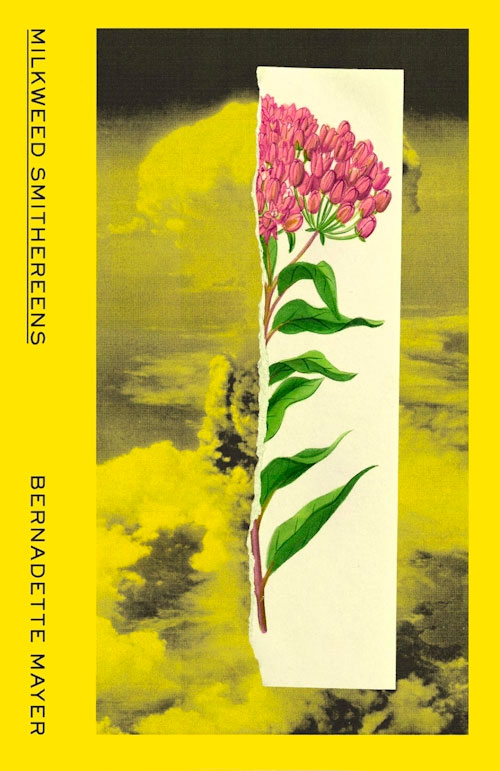“Bernadette Mayer’s Milkweed Smithereens (New Directions), a collection of older and newer poems, offers further proof of her importance in the contemporary American poetry landscape. Mayer’s poetry has always been an exuberant embrace of quotidian life—from the justly celebrated Midwinter Day to decidedly unstuffy sonnets, trenchant commentaries on politics, and gorgeous chronicles of nature—in ways lyric, funny, arch, multitudinous, and always true. There’s no loftiness in Mayer’s work and world, notable in this ars poetica excerpt from “I IMAGINE A POEM by bernadette mayer (based on a poem by ALAN CASLINE):”
…i dare you to make this into a real poem, half
as wide & with all the sounds of the angelic choirs
of poetry, or, of the homelessness of poetry, or the wild
thyme-ish-ness of poetry. i wouldn’t say this of many
words but the word poetry would be stupid if it didn’t have
such a good etymology.
It’s fun reading such poems aloud, the repetitions reminiscent of one’s heartbeat, with a syntax that feels like running with the wind at one’s back. At the same time, the content decisively democratizes what is poetry, and who can be a poet. Not solely of the academy, but of the people. Not of closed doors with secret handshakes, but of the city streets and in nature. What could be more contemporary? There’s a poem for every taste in this collection, though not because Mayer wrote for a specific audience. In writing for herself she wrote to and for us all.
You might note that I haven’t yet mentioned that Mayer passed away in the fall of 2022. In talking about this collection to my NBCC colleagues, my poetically-inclined friends and many others, I’m pretty sure I’ve used the word “bittersweet” quite often, as this is her last publication. Yet in a world that is constantly breaking one’s heart, in ways fleeting and catastrophic, the more I’ve read this collection and considered it within the span of Mayer’s unforgettable career, the thumb on the emotional scale is now on the side of celebration. There’s gratitude in having even more of her work to close-read and enjoy, but more so, there’s the inspiration of an artist continuing to create until the very end of a storied and significant life.
This collection with its bright yellow cover, named for a plant that lures and nourishes butterflies and other pollinators, is a raucous, kaleidoscopic picnic of style and content, that entices—and sustains—with its colorful and fragrant language. In her 1987 poem “The Tragic Condition of the Statue of Liberty,” one of my favorites not included in this collection, Mayer wrote: “I was surprised and saddened when I heard that the Statue of Liberty was in such a serious state of disrepair & I want to help / This is the most generous contribution I can afford.”
Milkweed Smithereens is a final, generative and oh so generous contribution to poetry, to us, and a cause for celebration.



